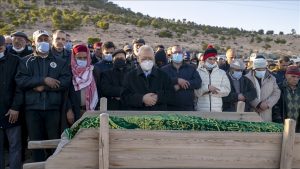By: Sarah Peck
Impunity Watch News Staff Writer
STRASBOURG, France – On October 8, 2024, the European Court of Human Rights (ECHR) ruled in four separate cases that Turkey had violated Article 10 of the European Convention for Human Rights, the right to freedom of expression. According to the ECHR, the Turkish government wrongfully imposed on seven individuals suspended sentences of imprisonment and lengthy probations for comments each had made criticizing the governing bodies of Turkey, including the President and Prime Minister at the time.
 |
The Convictions
Bayram Yorulmaz, Abuzer Serdar Özlü, Binali Erdoğan, Mihriban Şorli, Tugay Kurnaz, Saide İnaç, and Jinda Açıkgöz were all convicted by Turkish courts of offenses under the Turkish Criminal Code as a result of either verbal or written criticisms of the Turkish Government or its officials. The convictions included:
Bayram Yorulmaz: A public official at the Adana courthouse in Turkey charged with the offense of insulting a public official.
Abuzer Serdar Özlü: A Turkish national convicted of public denigration of the Turkish Nation, the Republic of Turkey, the Grand National Assembly of Turkey, and the judicial bodies of the state for nine publications he had made on his Twitter account in March and April 2016.
Binali Erdoğan: A Turkish national convicted of insulting the President of the Republic via a Facebook post.
Mihriban Şorli: A Turkish national convicted of insulting the President of the Republic via comments she made verbally during an altercation with police officers.
Tugay Kurnaz: A Turkish national convicted of insulting the President of the Republic and overtly insulting a public official via Facebook and Twitter.
Saide İnaç: A German national convicted of insulting the President of the Republic by sharing an article via Facebook post, which stated that the President of the Republic had provoked attacks on the Kurds and caused their massacre.
Jinda Açıkgöz: A Turkish national convicted of insulting the President of the Republic via Facebook posts.
The Criticisms
The individuals’ criticisms varied in severity. Some examples include:
Mr. Yorulmaz: “They sneeringly give each other as gifts the paintings of the people they condemned to death… What is this? Effrontery? Insolence? Perversion?”
Mr. Özlü: “You suspended the Constitution and cancelled out the police and the judiciary because of the bribes this man distributed to your Ministers!”
Mr. Erdoğan: “You and your damned presidency, that’s enough!”
Ms. Şorli: “You [your] dishonourable Tayyip (şerefsiz) can’t do anything to me, Tayyip’s soldiers killed my brother in the mountains, I’m going to retaliate.”
The Sentences
For each of the convictions, the Turkish Government handed down the following sentences:
|
Individual |
Imprisonment |
Probation |
|
Bayram Yorulmaz |
Eleven months and twelve days, suspended |
Five years |
|
Abuzer Serdar Özlü |
Five months, suspended |
Five years |
|
Binali Erdoğan |
Held for one month in pre-trial detention and sentenced to ten months, suspended |
Five years |
|
Mihriban Şorli |
Ten months, suspended |
Five years |
|
Tugay Kurnaz |
One year, two months and seventeen days, suspended |
Five years |
|
Saide İnaç |
One year, five months and fifteen days, suspended |
Five years |
|
Jinda Açıkgöz |
One year, two months and seventeen days, suspended |
Five years |
The ECHR’s Ruling
In each of the cases, the Turkish Government argued that the suspension of the prison sentence meant that the individuals had not suffered any obligations or restrictions, and therefore did not have victim status. However, the ECHR determined that despite the suspension of the imprisonment, the criminal convictions amounted to an interference with their exercise of the right to freedom of expression as the sentences may have had a deterrent effect. The ECHR further noted that the Turkish national authorities failed to weigh the interests at stake in accordance with the criteria in Turkey’s case law and the interferences were not shown to have been necessary in a democratic society.
Citing Durukan and Birol v. Türkiye, the ECHR explained that Article 231 of Turkey’s Code of Criminal Procedure, which provides for the suspension of pronouncement of judgments entailing convictions, did not offer the required protection against arbitrary infringement by the public authorities of the rights guaranteed by the European Convention for Human Rights.
The ECHR found that the Government of Turkey had violated the right to freedom of expression in each case and ordered Turkey to pay following penalties:
|
Individual |
Non-Pecuniary Damages |
Costs & Expenses |
|
Bayram Yorulmaz |
2,216 euros (EUR) |
EUR 1,500 |
|
Abuzer Serdar Özlü |
EUR 2,600 |
EUR 1,000 |
|
Binali Erdoğan |
EUR 5,000 |
N/A |
|
Mihriban Şorli |
EUR 2,600 |
N/A |
|
Tugay Kurnaz |
EUR 2,600 |
N/A |
|
Saide İnaç |
EUR 2,600 |
N/A |
|
Jinda Açıkgöz |
EUR 2,600 |
EUR 1,000 |
For further information, please see:
ECHR – Case of Açikgöz v. Türkiye – 8 Oct. 2024
ECHR – Case of Durukan and Birol v. Türkiye – 3 Oct. 2023
ECHR – Case of Erdoğan and Others v. Türkiye – 8 Oct. 2024
ECHR – Case of Özlü v. Türkiye – 8 Oct. 2024
ECHR – Case of Yorulmaz v. Türkiye – 8 Oct. 2024



